Tales from the Bark Side
Latest Post
Positive Thinking and the Big, Black Dog
I am saddened when I hear people who operate animal rescues say they expect to have a dog for a long time because he’s a black dog… or she’s a Pit mix…or he’s a fence jumper who doesn’t like cats. Those things can all be true, but if a rescue approaches an animal’s potential adoption with an outlook based on perceived limitations, they close that animal off to so many adoption opportunities.
I used to believe that black dogs were especially hard to place. My own black dog, Toby, was at a no-kill shelter for a year before I adopted him. That same shelter had black dogs that were there for two, three, even five years. After learning this, I was so convinced of the big, black dog syndrome that I even published an article in a magazine about it. Now, I’m not so convinced.
I’m not saying there is no basis for the belief that it’s hard to find a home for a black dog. There is an overload of black dogs in shelters, and they don’t show well when they’re peering from dimly lit kennels in the bottom row of city pounds. Once out of that environment, though, their chances improve greatly. I’ve found homes for three black dogs in the last year. Once I started heavily marketing them with flyers and on facebook and networking them with my rescue friends, it took three weeks to find a home for one, two months for another and five months for the last one. With that dog, I posted 80 flyers, received calls from 25 people, and kept at it, obsessively, until she met the right person.
Compare that with the matted Shih Tzu I got out of the shelter a year ago. Length of time it took to get that little dog adopted to a new home: One day.
Of course, it is generally harder to find a home for a big dog than it is for a Shih Tzu. Small dogs are more acceptable to landlords, eat less and cost less in general (unless you buy them a lot of fancy coats and sweaters, that is). All I’m saying is that when it comes to finding homes for animals, if you expect success, and work hard at it, you will find it. You’ll be friendlier, which makes you more approachable, and you’ll meet the right person at the right time, who will love that dog. On the other hand, if you expect obstacles and failure, those are exactly the results that you will produce.
When I post a flyer for an adoptable dog on a bulletin board in a coffee shop, bookstore, or grocery store, I always say to myself, “The right person is going to see this. This dog is going to a home with a person who needs her just as much as she needs them.”
I’m usually only working on one dog at a time, not dozens, like most rescue groups. Still, there is no reason rescue groups can’t approach finding homes for alleged “hard-to-adopt” dogs with a different mindset, one that doesn’t cling to the idea that a dog is destined to spend a year or two in rescue, often boarded in a kennel, because rescuers can’t open their minds to the possibility that there are all kinds of people out there, looking for all kinds of dogs.
When it comes to black dogs, there are plenty of people out there who prefer black dogs. That’s what they’ve always had, and that’s what they’ll always want. Why do so many rescue people refuse to believe that, at the expense of the dog for which they are trying to find a home?
Sure, you can approach finding a dog a home with the attitude “Big, black dogs are harder.” But what if you embraced the outlook, “Single women in the city love big, black dogs. They feel safe with them” and then posted flyers in an area of the city where a lot of single women live? What if you told yourself, “There is an active person out there who would love to run or walk with this (fence-jumping) dog every morning” and then showed up at running group events trying to find that person who could be the perfect match for your dog?
Instead, some rescues reinforce the hard-to-adopt-black-dogs theory by failing to market black dogs and boarding them out of sight from the adopting public for months – even years– while those dogs develop behavior problems from being kenneled 24/7, day in and day out with no physical or mental stimulation.
And, yes, those particular big, black dogs are certainly harder to get adopted – thanks to rescues that put those dogs in circumstances that actually led to them becoming “unadoptable.”
Our attitude makes all the difference for the dogs for which we try to find homes. Give these dogs the gift of your own positive thinking. Don’t delay finding their future home because in your heart, you don’t actually believe that home exists for a black dog, or a Pit mix or any dog you’ve labeled “hard to adopt.” It’s up to you, their rescuer, to set aside negative beliefs and put forth an extra effort to make sure every dog in your care finds the home he or she deserves.

